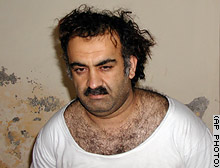Spain's High Court is due to deliver its verdicts on Monday on 24 people accused of al Qaeda membership, including three who face more than 70,000 years in jail each if convicted of helping the September 11 hijackers.
The verdicts will be a crucial test of the credibility of the multiple investigations of Islamist militants launched by Spanish magistrates and around Europe.
The three-judge panel heard from more than 100 witnesses during a two-and-a-half month trial that ended in early July -- Europe's biggest trial of suspected Islamist militants.
September 11-related prosecutions around the world have had little success.
The central figure in the Madrid trial is Imad Eddin Barakat Yarkas, also known as Abu Dahdah, who is accused of being the leader of an al Qaeda cell in Spain.
If convicted of helping the hijackers plan the 2001 attacks on New York and Washington, he could face jail terms of 74,337 years -- 25 years for each of 2,973 people killed plus 12 years for leading a terrorist group.
Yarkas and two others could be asked to pay a total of more than $1 billion (555 million pounds) in compensation to families of September 11 victims.
Yarkas and the other defendants have protested their innocence, saying there is no basis for the charges.
"It's a myth. No cell exists," Yarkas told the court. "All of us here are friends and neighbours ... and they have tried to invent a cell."
Yarkas and Driss Chebli, another defendant, are accused of helping prepare a July 2001 meeting in Spain at which prosecutors say the September 11 attacks may have been planned.
Investigators believe hijacker Mohamed Atta and Ramzi bin al-Shaibah, suspected coordinator of the US attacks, attended the meeting.
Chebli also faces prison sentences totalling more than 74,000 years if convicted on all counts.
The third defendant accused of a role in the September 11 attacks is Syrian-born real estate developer Ghasoub al Abrash Ghalyoun, who prosecutors say travelled to the United States in 1997 and filmed New York City landmarks such as the World Trade Centre, the Empire State Building and the Statue of Liberty.
He is alleged to have passed on the videotape to al Qaeda.
However, the video, played at the trial, bore all the hallmarks of standard holiday picture-taking, with pictures of friends that included the cue "Say cheese".
The High Court freed Ghalyoun on bail in May, indicating the judges may be leaning towards acquitting him, legal sources said. Five other defendants were conditionally freed in June.
However, two other defendants freed for health reasons, including Al Jazeera journalist Tayseer Alouni, were re-arrested last Friday. The court considered them a flight risk.
Alouni and Jamal Hussein each face nine years in prison if convicted of belonging to a terrorist group.
Alouni interviewed al Qaeda leader Osama bin Laden shortly after the September 11 attacks. Prosecutors accuse him of carrying money intended for al Qaeda members during visits to Afghanistan for his journalistic work. He denies the allegations.
The case, which pre-dates the al Qaeda-linked Madrid train bombings of March 11, 2004 that killed 191 people, is one of several probes of Islamist militants launched by crusading Judge Baltasar Garzon. Another judge has accused more than 100 people of a role in the March 11 attacks. |
 U.S. military officials have held initial hearings for three terrorism suspects at Guantanamo Bay, including the alleged mastermind of the September 11 attacks on the United States, the Pentagon said on Monday. Pentagon spokesman Bryan Whitman said a three-member panel examined the case of Khalid Sheikh Mohammed at a closed hearing on Saturday at the U.S. military prison camp on Cuba.
U.S. military officials have held initial hearings for three terrorism suspects at Guantanamo Bay, including the alleged mastermind of the September 11 attacks on the United States, the Pentagon said on Monday. Pentagon spokesman Bryan Whitman said a three-member panel examined the case of Khalid Sheikh Mohammed at a closed hearing on Saturday at the U.S. military prison camp on Cuba.
 The suspected leader of al Qaeda in Spain traveled with Sept. 11 hijacker
The suspected leader of al Qaeda in Spain traveled with Sept. 11 hijacker